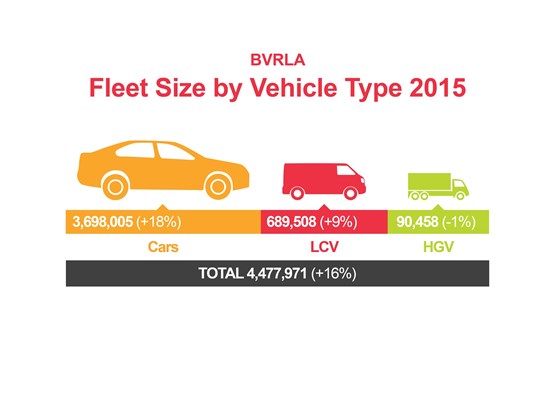The British Vehicle Rental and Leasing Association grew its membership in every category in 2015 and saw its combined member fleet rise to a record high of nearly 4.5 million vehicles.
The association’s membership has grown to 780 members, reflecting the growing popularity of vehicle finance and pay-as-you-go road transport.
The huge purchasing power and influence of the sector is clearly demonstrated by the fact that BVRLA members are responsible for one in every nine cars, one in every five vans and one in every five trucks on the road.
BVRLA chief executive Gerry Keaney said: “We were delighted to welcome more than 100 new members in 2015, a clear reflection of both the health of our sector and the vital role the BVRLA plays in helping these companies to operate in an increasingly regulated environment.
“We will be working harder than ever in 2016 as we tackle the issues faced by our expanding and diverse membership.”
Looking ahead to the next 12 months, the BVRLA’s Chief Executive has provided the following outlook:
- Automotive lobbyists and legislators will spend much of the year trying to thrash out a new agreement that will create a secure, standardised and fair technology framework for sharing vehicle data between manufacturers, vehicle owners, the independent aftermarket and other third-party service providers.
- Fleet owners will have to deal with the aggressive market strategies of certain OEMs who see their connected car platforms as a key opportunity to gain a direct relationship with the customers of rental and leasing companies. OEMs are also trying to gain a bigger share of the vehicle repair and servicing, breakdown and mobility services markets, which competes directly with the offerings provided by rental and leasing companies.
- Advanced Driver Assistance Systems (ADAS) will make major inroads into fleet vehicles in 2016, with the biggest impact being seen on road safety.
- Raising the profile of the Grey Fleet and its impacts on costs, emissions and road safety will be a priority for the BVRLA this year. Policymakers will come under increasing pressure to tackle the issue and our members will be there with solutions.
- The government will be tempted to use the recent VW emissions crisis as an excuse to raise fuel duty as it looks to eliminate its Budget deficit.
- Hybrids will continue to lead the market for ultra-low emission vehicles as more manufacturers lower their prices. A growing range of vehicles with different capabilities and price points will seduce growing numbers of company car drivers.
- The car sharing market will continue to mature with the emergence of more corporate mobility schemes and a long-awaited surge in electric car club use in London.
- The changing demographics of UK motoring meant that the government needs to give serious consideration to the future of benefit-in-kind taxation, salary sacrifice agreements, fuel benefit charges and capital allowances. We will continue to call for a tax regime that places a fair and proportionate burden on business motoring and incentivises cleaner fleets.
- Fleets’ frustration with government agencies such as the Driver and Vehicle Licensing Agency (DVLA) and Driver and Vehicle Standards Agency (DVSA) will grow as budget cuts result in them inevitably delaying the introduction of some digital fleet services.
- Uptake of telematics-enabled usage-based insurance will expand from the younger driver sector into both the rental and fleet markets.


















Login to comment
Comments
No comments have been made yet.